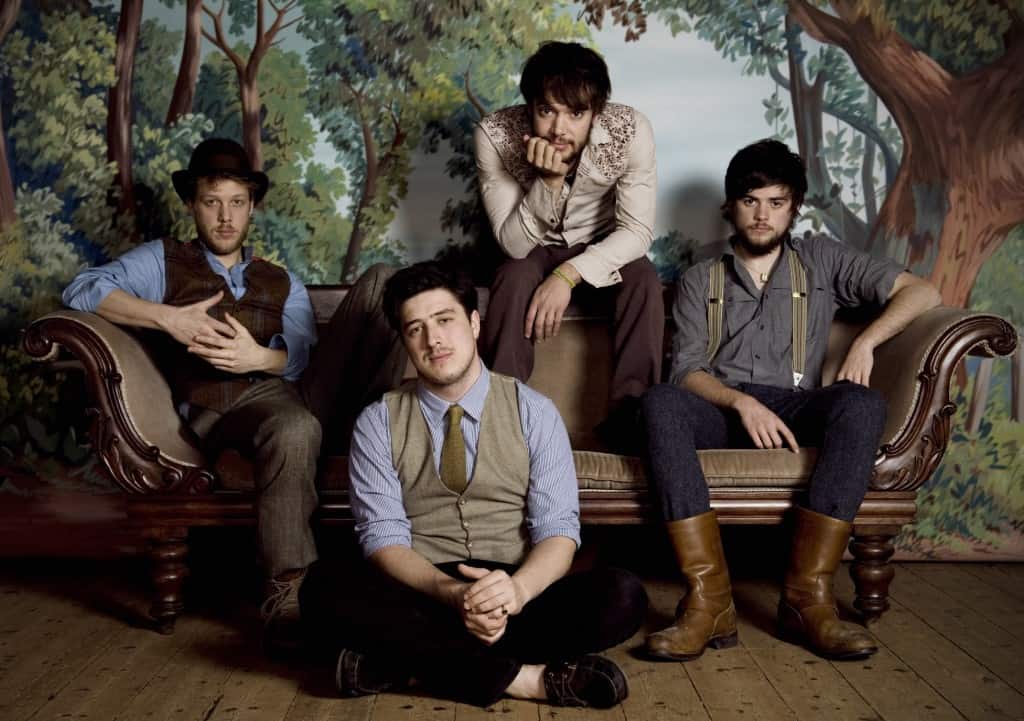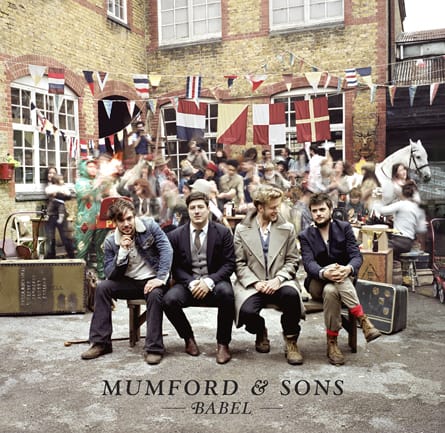
Mumford & Sons Press Photo 2
“People are always hungry, cold and full of desire.”
Last week this claim closed Perry Petrich’s thoughtful review of Mumford and Son’s new album, Babel. I’ve been thinking about those words ever since. Well, that and the gift of socks and chocolate that he mentioned. Mmm… socks and chocolate. We’ll come back to that later.
Perry does an artful job of exploring the source of Mumford & Sons’ popularity – the vague, relational, spiritual appeal to raw desire that allows them a broad, record-selling, appeal. And I think he’s right to wonder: for what do we hunger? What warmth do we seek? What fulfills our deepest desires? Clearly there are no easy answers to be found in Mumford’s mumbles, but I’m not as convinced that all we’re left with is our cold hungry longing.
Amidst the vagaries of our desirous lives, there is still something that claims that the consoling presence of God can be found, uncovered, called by name. That something names those increases of faith, hope, and love signs of the divine presence. That’s right. Long before St. Justin of Timberlake broke onto the scene St. Ignatius was already asking that hit-making question: “Where is the love?” Even in the Babel (good title), if it’s God we’re looking for, then we should search for signs of faith, hope and love. So let’s do just that.
***
Faith – I think we should add a third leg to the wobbly and exhausted “spiritual vs. religious” stool. And I suggest faith. I’m less interested in what you are (a spiritual being, a religious person, etc.) than I am in what you’re doing with your life. Whether you’re spiritual or religious (or both!) I want to ask: To what or whom do you entrust yourself? Have you found something worth living for? Are you faithful to it? What moves you from doubt to trust? Is there a place in this world for fidelity? Where is your faith?
Critics are right to point out that Marcus Mumford is often vague in his longing. Does he want a lover or a puppy? Or does he want God? The object may not be clear but the subjective posture of faith is evident in his songs. Even more, I actually think Mr. Mumford is more explicit than Perry let’s on. Not always certainly, but, like any seeker, occasionally his attempts at naming the thing that escapes him turn his tongue to the one who answers all those hungers mentioned above. God. Jesus. Lord. And no, this isn’t me reading my own beliefs onto his longings, those are actual lyrics; each of these names is invoked with regularity throughout (irony?) Babel.
At the very least, the relationality hidden in Marcus Mumford’s dictional choices seems to suggest, first, that grace is available and, second, that we can choose: “In this twilight our choices seal our fate.“1 Good for Mr. Mumford, I suppose, that he’s chosen to “raise his hands” and “paint his spirit gold”, “bow his head” and “keep his heart slow.”2 He may be a “cad but he’s not a fraud” for “he’s set out to serve the Lord.“3 Whatever else he’s doing he’s putting faith in something.
Hope – In Babel there is plenty of doubt. But I think that, in our days, expressions of doubt are just as often an investment of the hopeful as anything else. Only the pitifully apathetic live absolutely without hope. Hope dies last.4 The doubters? Well they’re just being honest about asking for it, hope, that is.
It’s no stretch to say that Mumford’s sons inherit these songs of longing from Mumford’s grandfathers. From the earliest parents (Adam and Eve) onward you can hear the indignation of creatures crying out in turn as they struggle to find and accept their place in the family of creation. Marcus Mumford is no different: “Crawl on my belly until the sun goes down. I’ll never wear your broken crown. I took the road and I f**ked it all away. Now in this twilight, how dare you speak of grace?”5
Yeah, I know. He doesn’t sound very hopeful here. But neither did the ancient psalmists for whom poetical allusions and sung expressions of frustration and despairing doubt were a familiar trope. Fully one third of the Biblical psalms are dedicated to lament and to woeful questioning of God. Here’s my rough translation of Psalm 30: “Question: Does the dust praise you, Lord? Answer: Nope! So you better save my sorry ass!” If the Biblical psalmists can be so crude then why not our own?
Let’s take a closer look at “Hopeless Wanderer”, the track that drew Perry’s attention. It’s a song in which Mr. Mumford embraces vulnerability and leaves the safety of the dark woods by choice (“I came out of the woods by choice” he sings). Then this newly emerged soul begs for what we all need: support and encouragement (“Hold me fast!”), and he seems wrought by self-doubt (“I’m a hopeless wanderer!). Having stepped out from the dark into the spaciousness of vulnerability he is lost in the light of a newfound openness.
Ultimately, this emerging soul – despite naming himself a hopeless wanderer – is not hopeless at all. Instead, he’s, tentatively to be sure, full of hope. Marcus Mumford confesses elsewhere on the album that he “believes in grace and choice.”6 Here it seems that if the choice is one of vulnerability, and it’s grace that invites a response to vulnerability. He’s looking for a promise, for something in which to place his trust. Essentially he’s saying, “If you hold me, I’ll learn to love.”
By virtue of his confession of doubt and lamentation the “faithless” puts his faith on the line; the “hopeless” makes a prayer of hope. We may still wonder, faith in what? Hope for what? Well, there’s only one answer to that question.
Love – This is crucial: only in love.7 Only in relation to the one thing wanted, the one thing that dispels darkness and opens up the whole sky does our longing find its fulfillment. The hopeless wanderer puts his faith in the beloved (in the first steps out of darkness) and trusts (a sign of hope even in a state of doubt) that love is possible in this big bright world of ours.
In the end, our hopeless wanderer sings hopeful words: “I will learn to love the skies I’m under.”[8. Lyric from Hopeless Wanderer.
***
We’re not always, not ultimately, cold, hungry and full of desire. Especially when we choose the vulnerability that makes us capable of faith, hope, and love. Sometimes a friend gives a gift of socks or chocolate. Sometimes we’re fed. Sometimes we’re warmed. Sometimes our longing steps out of the darkness and reveals itself for what it really is: love.
It’s love we’re longing for and our longing is love. And what about the gifts we give each other? Well, I put my faith in the hope that it’s never just socks and chocolate. The gift that we are to give is always the gift of love.
Even in doubt we can be faithful; we can be hopeful; we can be lovers. And we can’t ever forget it.
— — — — —
- Lyric from Broken Crowns ↩
- Lyrics from I Will Wait ↩
- Lyrics from Whispers in the Dark ↩
- Fancy Academic-ish Footnote: it was Studs Terkel who wrote “Hope Dies Last: Keeping the Faith in Difficult Times” ↩
- Lyric from Broken Crowns ↩
- In the title track: Babel ↩
- Fancy Academic-ish Footnote #2: Karl Rahner said, “Only in love can I find you, my God.” ↩


